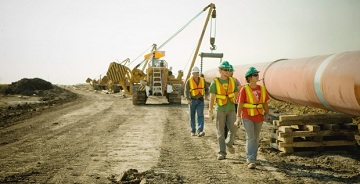After a harsh lesson in crude economics, new pipelines now biggest issue for Canada
 The current rock-bottom price for Canadian crude in the U.S. market is the No. 1 challenge facing the country today, leaving governments short of revenue and possibly leading to a big slowdown in future oilsands investment, the head of pipeline-builder Enbridge said Wednesday.
The current rock-bottom price for Canadian crude in the U.S. market is the No. 1 challenge facing the country today, leaving governments short of revenue and possibly leading to a big slowdown in future oilsands investment, the head of pipeline-builder Enbridge said Wednesday.“Nobody’s making any more oil and gas, so we’d better get a fair value for it,” Al Monaco, Enbridge’s chief executive, told the Alberta Enterprise Group. “There is no more critical issue facing Canada today. Failure to develop a consensus around energy development will have serious consequences, for this generation and generations to come,” he said, adding the difference between Canada and U.S. crudes is costing governments and companies about $75 million each day.
“With so much at stake, this is no time to be standing on the sidelines.”
Major firms like Enbridge, TransCanada and KinderMorgan all have major pipeline projects planned to help get Canadian crude to the West coast, Eastern Canada and the U.S. Gulf, where much higher prices can be had.
Monaco said a “balanced national discussion” is needed to make all Canadians aware of the critical importance of these projects in the face of growing opposition in some areas.
“The opposers are now focused on pipelines, but they are trying to stop energy development generally,” he said, adding that public expectations have also evolved and people want to see companies improve their performance.
“As an industry we can’t just complain about market access and opposition … we need to evolve. We need to engage communities earlier and more often and spend time with them on all the issues.”
In fact, he said, this is exactly what Enbridge should have done in the early days of its proposed Northern Gateway pipeline project between Alberta and Kitimat, B.C.
“We should probably have got on the ground sooner. Building trust is very important with communities these days,” he said.
Enbridge has already made many route changes to Northern Gateway based on local advice, he added.
With so much at stake, Monaco said pipeline firms cannot be the only proponents of these critical projects. He hopes governments, unions and energy industry employees will all express their support in public.
“I think we are starting to see a more balanced public debate recently, one that recognizes this is more than simply an industry problem but rather an issue that impacts public finances and public services.”
Alberta Finance Minister Doug Horner said he thinks other provinces are finally getting that message.
“The significance of this logistical jam (the lack of pipeline capacity) for Canada did not become evident until it was created by our own over-production. And when people see that this is going to affect the GDP of the country, you start to see why Northern Gateway was important.”
Horner said the public is “starting to get educated about the real conditions, the safety and the environmental impacts that can be mitigated, and we are starting to see a lot more educated and reasoned discussion” about pipelines.
You can return to the main Market News page, or press the Back button on your browser.

